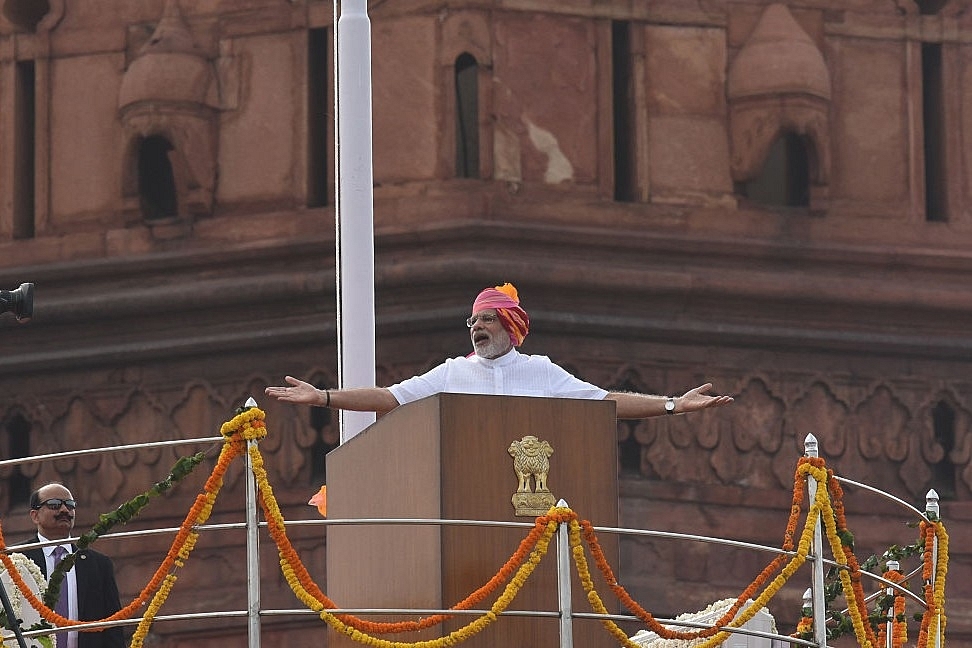Ideas
Independence Day Speech: Why India Must Look Beyond Red Fort
- The Red Fort stands as a symbol of royal power and medieval notions of ‘ruled’ and ‘rulers’.
- It’s time to change and take the Independence Day speech to other parts of the country.

Prime Minister Narendra Modi addresses the nation during the Independence Day celebration at Red Fort in New Delhi. (Arvind Yadav/Hindustan Times via GettyImages)
India is awaiting another Independence Day address by Prime Minister Narendra Modi from the ramparts of the Red Fort in Delhi. He is expected to speak about the progress made by the country over the past one year and his vision for the coming year. This will be Prime Minister Modi’s final speech as his first term as the leader of the country ends early next year. He is also expected to speak about his achievements over the past five years.
But the symbolism of delivering an important speech to the country on Independence Day from a medieval fort is incompatible with the idea of a democratic country that treats all its citizens as equal. The Red Fort stands as a symbol of royal power and medieval notions of ‘ruled’ and ‘rulers’. One might argue that the content of the speech is what matters, but the symbolism of ‘new-age kings’ is blatantly visible when the leader of the country goes on top of a fort to deliver the annual speech.
The appropriate venue for delivering a national address is parliament. In the most powerful democracy of the world, the president delivers the state of the nation address at the joint session of the US Congress. In South Africa, the president delivers the state of the nation address to a joint sitting of parliament. In Russia, the ‘presidential address to the federal assembly’ is also delivered to a joint sitting of legislatures. India is perhaps an exception among major democracies of the world, where the leader of the country speaks from a fort.
One can argue that the Indian Prime Minister need not emulate other global leaders by speaking in parliament. India, being a unique country, can set innovative examples for other countries to follow. Future prime ministers can look into the idea of choosing venues outside of Delhi to deliver their Independence Day speeches. The next prime minister can perhaps deliver his/her first Independence Day address in Srinagar, second in Kanyakumari, third in Guwahati, fourth in Gandhinagar and the final one in Bhopal. That way, five major regions of the country can be covered in his/her full term.
It can be argued that India remains a vibrant democracy in spite of the minor aberration in the location of its leader’s podium for an important speech. But, we must note that India still remains a feudal setup where nepotism and political dynasties thrive in majority of political parties. Links and influences still matter a lot in our society. The notion of ‘hierarchy’ on the basis of birth still finds acceptance among its masses.
Prime Minister Modi had put forth the concept of 'New India' in his 2017 Independence Day speech. However, 'New India' is somehow incompatible with the country’s obsession to a feudal fort for its Independence Day celebrations. 'New India' should be a country that has unshackled itself from colonial mindset. The Prime Minister's 'New India Pledge' includes, 'an India driven by innovation, hard work and creativity' and 'an India free from corruption, black money and dirt'. This is difficult to realise with existing attitudes of citizens towards their rulers and hierarchical systems.
People must see their leaders as equals, who are chosen to deliver governance, not as rulers, who are speaking down to them from a fort. Only then will they see themselves as participants and consumers of government services and not as 'beneficiaries' of governance/schemes. Such an attitude will aid in checking corruption and constant scrutiny of people's representatives. A 'New India' needs new attitudes along with development, jobs, infrastructure and higher standard of living. A country that has rejected feudal mindset is extremely important for building a 'New India'.
Red Fort is part of India’s past and a symbol of monarchy, not India’s democracy or its future aspirations. Using a monument to deliver Independence Day address is a lazy idea, which future prime ministers should do away with. The venue of this year's Independence Day celebrations is unlikely to change. But, the Prime Minister, who has been selling the idea of 'New India' can consider changing the venue of Independence Day speech in 2019, if he is re-elected to lead the country.
Introducing ElectionsHQ + 50 Ground Reports Project
The 2024 elections might seem easy to guess, but there are some important questions that shouldn't be missed.
Do freebies still sway voters? Do people prioritise infrastructure when voting? How will Punjab vote?
The answers to these questions provide great insights into where we, as a country, are headed in the years to come.
Swarajya is starting a project with an aim to do 50 solid ground stories and a smart commentary service on WhatsApp, a one-of-a-kind. We'd love your support during this election season.
Click below to contribute.
Latest